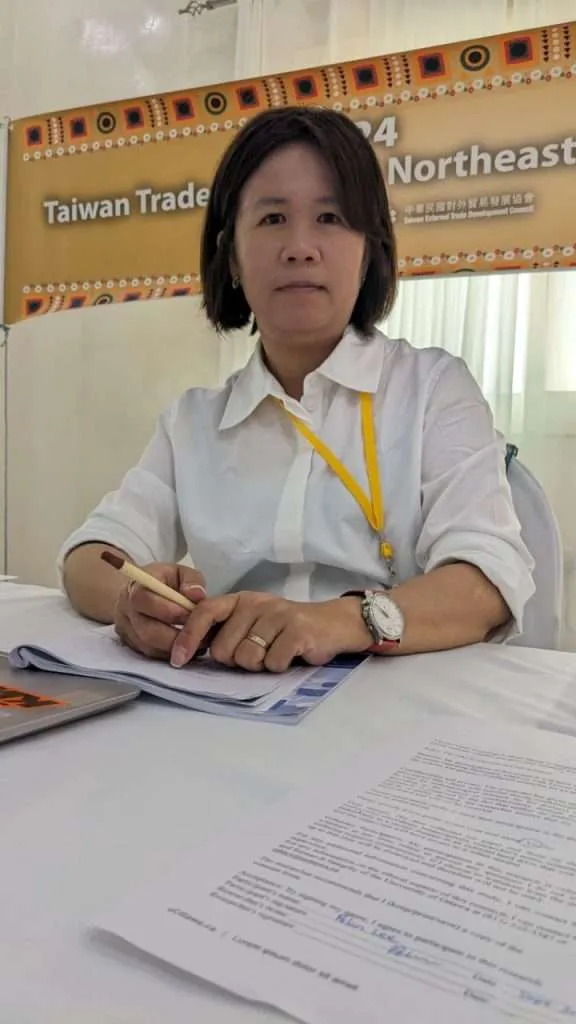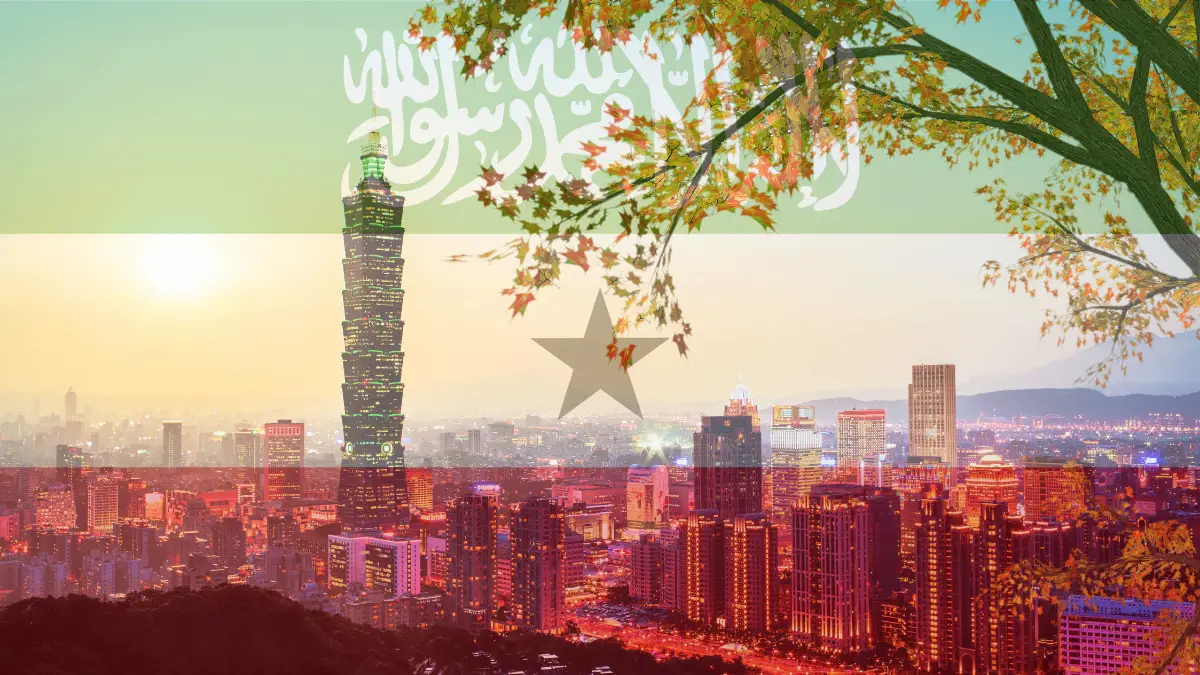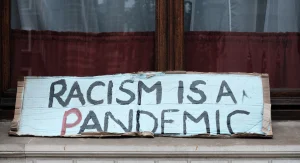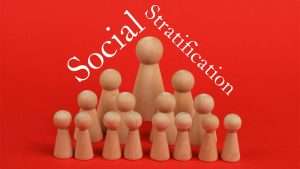Editorial Note: This article is the first article in a two-part series from guest contributor Richard Atimniraye Nyelade. Read the second article here.
Hargeisa, Somaliland — The 2024 Taiwan Trade Mission to Northeastern Africa, held at the Ambassador Hotel Hargeisa on September 30th, was more than just a business meeting. It marked a significant milestone in economic diplomacy and cross-cultural exchange, exemplifying Taiwan’s strategic approach to expanding its influence and forging partnerships in regions beyond its traditional markets. Organized by the Taiwan External Trade Development Council (TAITRA) and supported by the Ministry of Economic Affairs, the event underscored Taiwan’s interest in building stronger relationships in Africa, despite the diplomatic complexities faced by both Taiwan and Somaliland.
One of the standout participants was Mrs. Pelan Lee, the Sales Department Chief of Strong Way Industrial Co., Ltd, a Taiwanese company specializing in manufacturing engine parts for industrial companies. During our conversation, she shared her insights on Taiwan’s evolving relationship with Africa and the business prospects that lie ahead. Her reflections revealed a broader narrative of how economic diplomacy can be leveraged as a tool to overcome the challenges posed by limited diplomatic recognition and to create new avenues for cooperation in the Global South.

Theoretical Context: Economic Diplomacy, Soft Power, and the Global South
To frame Taiwan’s approach in Somaliland and Africa more broadly, we can draw on Joseph Nye’s concept of soft power(Nye, 2004) and Andrew Cooper’s (1997) understanding of economic diplomacy. Nye’s theory emphasizes that soft power—the ability to attract and co-opt rather than coerce—can be a powerful tool for states that lack hard power leverage. In Taiwan’s case, its economic engagement and people-centered development projects in Somaliland and other African nations exemplify a strategy of wielding soft power to influence international perceptions and establish deeper ties based on mutual benefit.
Simultaneously, Cooper’s concept of economic diplomacy explains how countries use economic resources to achieve political and strategic goals. This aligns with Taiwan’s efforts to establish partnerships in the Horn of Africa through trade missions, technological assistance, and developmental aid. These economic activities are not merely about securing markets but are part of a broader strategy to build goodwill and establish Taiwan as a responsible and valuable international partner.
The Taiwan-Somaliland partnership also offers an opportunity to engage the theoretical framework of subaltern realism, as articulated by Mohammed Ayoob (1995). This theory posits that small states, which often find themselves marginalized in the international system, develop unconventional foreign policy strategies to assert their agency. Taiwan and Somaliland, both unrecognized by the United Nations, are prime examples of subaltern actors that navigate the international order by employing strategies such as soft power, economic diplomacy, and normative values to compensate for their limited formal recognition.
Breaking Stereotypes and Building New Impressions
Mrs. Pelan Lee, a dynamic representative from Taiwan’s southern region, shared how her perception of Africa evolved since her first visit. “Before coming here, my image of Africa was shaped by common stereotypes—hunger, refugees, and conflicts. I thought it would be dangerous to walk alone on the streets,” she confessed. However, after visiting several African countries, including Egypt, Rwanda, and now Somaliland, her outlook changed dramatically.
“In Rwanda, for instance, I was amazed by the cleanliness of the streets and how organized the traffic is, even without many traffic lights. It reminded me of Singapore,” she noted with enthusiasm. “When I mentioned this to a local officer, he told me that they don’t want to be like Singapore; they want to be even better!” Such interactions highlight the ambitions of a new generation of African leaders and entrepreneurs who seek to redefine their countries’ narratives and project a positive image to the world.
These evolving perceptions are crucial in shaping Taiwan’s engagement with Africa. By focusing on capacity-building and community development, Taiwan is able to counter stereotypes and foster a relationship based on shared values and mutual respect. The Taiwan Trade Mission becomes a platform not just for economic exchange but also for transforming perceptions and building a more nuanced understanding of Africa’s potential.
Navigating Diplomatic Complexities
One of the central challenges facing businesses like Strong Way Industrial Co., Ltd., and indeed any Taiwanese enterprise, is the diplomatic status of both Taiwan and Somaliland. Neither is officially recognized by the United Nations, which poses unique challenges, especially for financial transactions. Mrs. Pelan Lee acknowledged this, noting that the inability to use SWIFT transfers directly for business was a significant limitation. “However, both sides have found ways to navigate these obstacles,” she explained, referencing the use of banks in Dubai and other channels as alternatives.
The use of these alternative financial routes reflects the concept of asymmetrical interdependence (Keohane & Nye, 1977), where states that are not equally powerful still find ways to engage in mutually beneficial exchanges. Despite the challenges of non-recognition, Taiwan and Somaliland leverage their shared status to develop unique solutions that reinforce their partnership. This creativity in diplomatic and economic engagement becomes a testament to their resilience and adaptability.
Prioritizing the People: A Message for African Nations
Mrs. Pelan Lee emphasized the importance of prioritizing the well-being of communities, aligning her perspective with core principles of peacebuilding and sustainable development. Drawing on Taiwan’s own experience, she highlighted that sustainable peace and economic growth are more likely to be achieved when leaders focus on serving the needs of their people, fostering inclusive development, and bridging divisions. “In Taiwan, we’ve focused on innovation and the well-being of our people,” she stated. Her message was clear: unity and a people-first approach are the keys to unlocking Africa’s potential.
This emphasis on community-centric development echoes human security frameworks (UNDP, 1994), which argue that the security of individuals and communities is as important as the security of states. By aligning its foreign policy with these principles, Taiwan not only demonstrates its commitment to Africa’s development but also positions itself as a responsible international actor.
Overcoming Local Challenges
Mrs. Pelan Lee’s time in Somaliland was not without difficulties. Upon arrival at Hargeisa’s airport, she and her colleagues encountered unexpected fees, despite holding official visas. “Some of my team members were asked for US$61,” she recalled. “I was asked to pay an additional $11, which was quite a surprise,” she added, noting that such fees could deter foreign investors.
Fortunately, with the assistance of embassy officials, the issue was quickly resolved. However, incidents like these underscore the need for Somaliland to improve infrastructure and streamline bureaucratic processes to attract more foreign businesses. Addressing these challenges is crucial for creating a more welcoming and conducive business environment.
Exploring New Opportunities
Strong Way Industrial Co. Ltd., with over 50 years of experience in the manufacturing sector, is looking to establish its presence in Africa despite the lack of direct customers in the region. “There aren’t many tractor or heavy machinery manufacturers based in Africa, but this is exactly why I’m here—to explore possibilities and build connections,” Mrs. Pelan Lee explained. Her participation, supported by TAITRA, reflects Taiwan’s strategic push to diversify its global economic partnerships and engage with emerging markets.
Conclusion: Taiwan’s Economic Diplomacy and the Relevance of Theoretical Frameworks
The 2024 Taiwan Trade Mission to Northeastern Africa serves as a testament to Taiwan’s strategic engagement in regions beyond its traditional markets. By applying the frameworks of soft power (Nye, 2004), economic diplomacy (Cooper, 1997), and subaltern realism (Ayoob, 1995), we gain a deeper understanding of how Taiwan and Somaliland navigate the constraints of non-recognition to build meaningful partnerships. The mission’s success highlights the potential for small or marginalized states to exert influence and redefine their roles within the international system.
Taiwan’s diplomatic push in Somaliland, despite local challenges and geopolitical complexities, demonstrates its capacity to adapt and innovate in a divided world. As the interview with Mrs. Pelan Lee concluded, her optimism was palpable: “The birth rate here is high, and there is a young generation that holds immense potential. In the next 20 years, Africa could grow tenfold,” she remarked. For Taiwan, Africa represents not just a market, but a partner in growth and innovation. The 2024 Taiwan Trade Mission has indeed set the wheels in motion for a new chapter of economic collaboration that bridges continents and fosters a new era of global cooperation.
References
- Ayoob, M. (1995). The Third World Security Predicament: State Making, Regional Conflict, and the International System. Lynne Rienner Publishers.
- Cooper, A. F. (1997). Niche Diplomacy: Middle Powers after the Cold War. Macmillan Press.
- Keohane, R. O., & Nye, J. S. (1977). Power and Interdependence: World Politics in Transition. Little, Brown and Company.
- Nye, J. S. (2004). Soft Power: The Means to Success in World Politics. PublicAffairs.
- United Nations Development Programme (UNDP). (1994). Human Development Report 1994: New Dimensions of Human Security. Oxford University Press.







